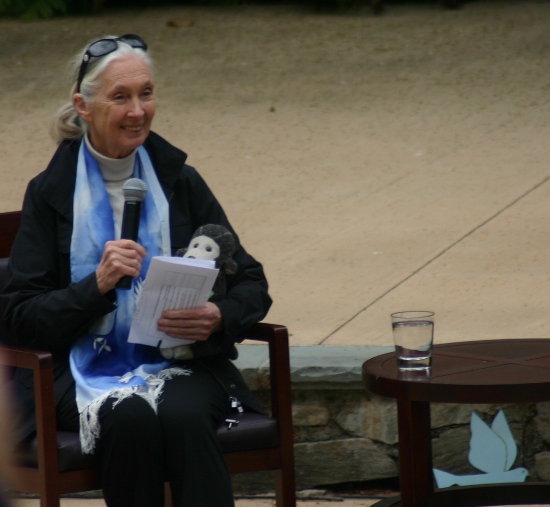
Jane Goodall
Vicky and I had the great honor of seeing Jane Goodall at American University in Washington DC this last weekend. The event was a sort of town hall meeting held outdoors in the cool fall air titled Conversation on Peace just a few days before the United Nations’ International Day of Peace.
Dr. Goodall opened the conversation with a small Dove Parade and her signature greeting in “chimpanzee.” She then explained how a “sense of urgency” keeps her going, motivated by the need to preserve our vanishing natural resources. The 77-year-old humanitarian, who founded the Jane Goodall Institute in 1977 and was appointed by the seventh Secretary-General of the United Nations Kofi Annan as one of the institutions venerable Messengers of Peace, has spent a lifetime dedicated to conservation, not just to preserve wildlife, but also to improve the quality of life for human beings all across the globe.
Dr. Goodall told us the story of her childhood, and how she was inspired by Dr. Doolittle, and wanted to learn how to talk to animals. Later, she read Tarzan, and developed a crush on him, but unfortunately he “married that other stupid wimpy Jane.”
These stories made her want to go to Africa and write a book about it, but being a girl and with World War II taking place, people consider this unrealistic. She worked as a waitress (the host mirrored my own thoughts when she mentioned it was hard to imagine the living legend in such an occupation) saved tips to get a boat trip to Africa, where she observed the chimpanzee tribes and wrote about them. Later she met the archaeologist Lewis Leaky and served as his secretary. He sent Goodall on trips to Africa and arranged for her to work on her PhD without first obtaining a Bachelor’s degree. During her studies she got in trouble because she gave chimps names and talked about their emotions, a violation of the academic principle of “anthropodenial” as I prefer to call it.
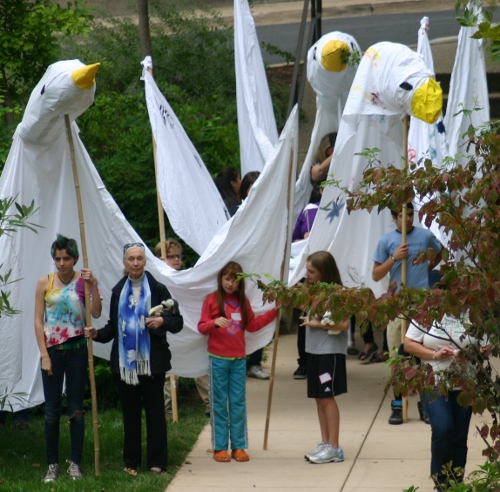
Dove Parade
Dr. Goodall talked at length about her Roots & Shoots Program. The name referring to the vigilance of plant life in overcoming obstacles set before it. “Look around you,” she explained, seeds give rise to little shoots and roots that can penetrate concrete to find water, they can get around the problems we have created. My arboreal-fanatic wife wasn’t the only one who loved this analogy.
Roots & Shoots covers many projects dealing with ecosystems, animals, and people. She described the “Fences to Freedom” project for finding islands that orphaned chimpanzees can inhabit as adults, and another project that focused on children kicked out of school for behavioral problems, who are given an animal to care for as therapy. She described Dove Parades on both sides of the Israeli-Palestinian border1, and an event where soldiers standing guard over project to restore natural resources lay down their guns to help children plant trees.
Question Session
Questions came in on hashtag #askjane from all over the world. My question was related to peace, but more of a scientific curiosity:
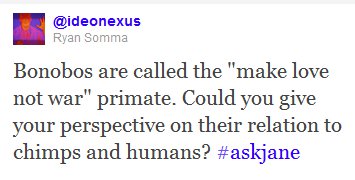
My #AskJane Tweet
Up against more inspiring and heartfelt questions, I didn’t figure it had any chance of being answered. But earlier in her talk she did address the importance of studying chimpanzees, who we are only one-percent different from genetically and may, therefore, learn much about ourselves from watching them. Like humans, they have two sides, a violent persona and an altruistic one. “Let not the sun set on your anger” was something her grandmother taught her.
Asked about zoos, Goodall explained that there is a spectrum of places for Chimps. On one end of that spectrum we have land set aside for conservation and at the other we have laboratory animals in confinement. In between we have different types of zoos. A good zoo provides stimulation for the chimps, and allows the chimpanzee to serve as an ambassador to the humans who visit, providing stimulation and education for both the chimp and the humans.
A question about 9/11 led to an interesting story, she was in New York at the time it happened, and spent the day watching the news and calling people to let them know she was alright. She was scheduled to give a talk in Portland to students about hope and peace, and was met with the difficult conundrum of what to say to them now. What could she say on the subject with such a horrific event on everyone’s mind? When she got to the school, she related her experiences living through World War II and reminded the students that we overcame a World War and a Great Depression and we would overcome this.
When asked about the planet’s growing population, about to hit 7 billion next month, Dr. Goodall related her advocacy for Family planning in Third World countries, and how volunteers were afraid to bring the concept to villages in Africa because they are so conservative and religious and birth control is often seen as impinging on reproductive freedom. However, the villagers actually welcomed the family planning counselors and were very receptive to their teachings, wondering why they did not offer their help long ago. Goodall explained that this is because family planning is a quality of life issue–about not having a family that’s larger than you can care for.
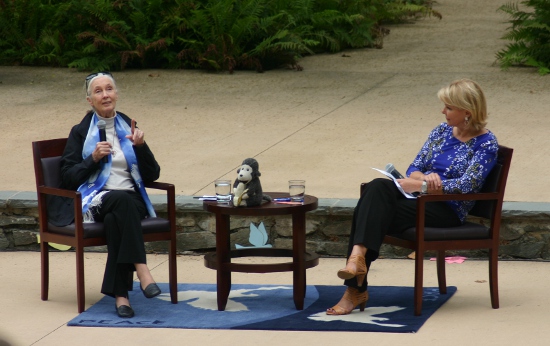
Jane Goodall Townhall
The question came up on how she engages opponents, for example, people who say animals are here for our use or, to quote Ann Coulter, “God said, ‘Earth is yours. Take it. Rape it. It’s yours.’” Dr. Goodall noted this is from Genesis 1:28, and that the people who interpret the passage to mean we are to exploit the Earth are focused on the term “dominion,” but this is a mistranslation. The actual word is more like “caretaker.” The other biblical translations of the passage I found online replace the word “subdue” with “bring under your control” and “dominion” with “rule,” which imply more educational interaction with the environment and benevolence.
Jane advised that we shouldn’t make changing people’s the minds the goal, but rather we should seek to change the heart through stories. You never know when you’ve gotten through to someone, she explained, they don’t want to admit their wrong, so never say, “I’m right and you’re wrong.” Instead, “tell stories.”
The most inspirational take-away from the conversation was when Dr. Goodall explained that life is a gift and we come into life with different gifts. Her gift is the ability to communicate, and we have to decide how to use our gifts. “You can’t live through a day without making some kind of impact,” she said, what kind of impact do you choose to make?
FootNotes
1 Later, when asked about her perspective on the Israeli-Palestinian conflict by an audience member, Dr. Goodall wisely explained that she was not qualified to speak on the subject.
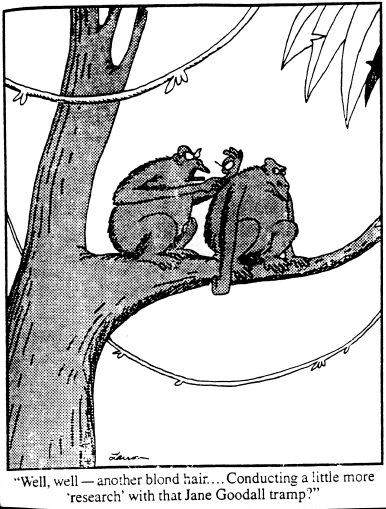
Far Side Cartoon Referencing Jane Goodall
Credit: Gary Larson
Further Reading
AU Ambassador’s Blog: Dr. Jane Goodall’s Townhall Meeting: A Conversation on Peace
Bush Warriors: What I Learned From Jane Goodall: A Bush Warrior’s Recent Experience
Comments
3 responses to “Celebrating the UN’s “International Day of Peace” with Dr. Jane Goodall”